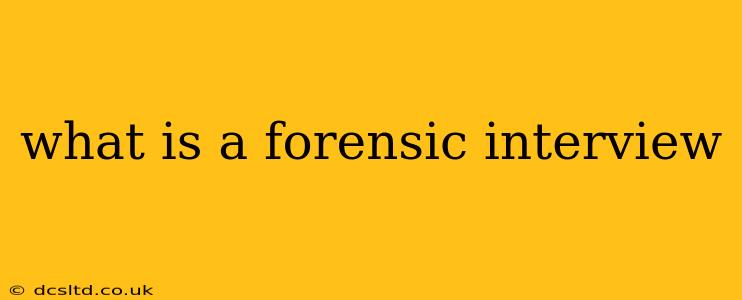What is a Forensic Interview?
A forensic interview is a specialized type of interview conducted with individuals, typically children, who may have experienced a traumatic event, such as abuse or neglect. Unlike a standard interview, a forensic interview prioritizes obtaining accurate and detailed information while minimizing the risk of causing further trauma to the interviewee. It's a carefully structured process designed to elicit reliable information that can be used in legal proceedings or therapeutic interventions.
The goal isn't just to gather information, but to do so in a way that is both effective and ethically sound. This means creating a safe and comfortable environment for the interviewee, building rapport, and using techniques that encourage truthful and detailed recall without leading or suggesting answers.
What are the key techniques used in a forensic interview?
Forensic interviews utilize several key techniques to maximize the accuracy and reliability of the information obtained. These techniques include:
-
Building Rapport: The interviewer starts by establishing a comfortable and trusting relationship with the child. This often involves using age-appropriate language, playing games, and engaging in light conversation to reduce anxiety and foster openness.
-
Open-ended Questions: Instead of asking leading questions (e.g., "Did he touch you?"), the interviewer uses open-ended questions (e.g., "Tell me about what happened that day.") This encourages the child to recount their experience in their own words without feeling pressured to provide a specific answer.
-
Active Listening: The interviewer pays close attention not only to the words the child uses but also to their nonverbal cues, such as body language and tone of voice. This provides valuable context and helps to identify inconsistencies or potential indicators of deception.
-
Minimizing Interruptions: The interviewer allows the child to tell their story without interruption, except to clarify or ask for further details. Interruptions can disrupt the flow of recall and potentially lead to inaccurate information.
-
Using Visual Aids: Pictures, dolls, or other visual aids can be used to help children express themselves, especially if they find it difficult to verbalize their experiences. These tools can facilitate communication and provide a less stressful way to describe events.
-
Detailed Questioning: Once the child has shared their initial account, the interviewer may ask more detailed questions to clarify specific aspects of the event. These follow-up questions aim to fill in any gaps and ensure a complete understanding of what happened.
-
Documentation: The entire interview is carefully documented, often videotaped, to create a permanent record. This allows for thorough review and eliminates the potential for misinterpretations or memory lapses.
Who conducts forensic interviews?
Forensic interviews are typically conducted by specially trained professionals, often social workers, psychologists, or law enforcement officers who have received specialized training in child interviewing techniques. This training emphasizes the importance of ethical considerations, minimizing trauma, and adhering to strict guidelines to ensure the reliability and admissibility of the interview in court.
What is the difference between a forensic interview and a regular interview?
The key difference lies in the approach and the goal. A regular interview aims to gather information in a straightforward manner, whereas a forensic interview prioritizes obtaining accurate and detailed information from a potentially vulnerable individual while minimizing further trauma. The forensic interview is meticulously documented and designed to be admissible as evidence in legal proceedings. Techniques like building rapport, minimizing interruptions, and using open-ended questions are far more emphasized in forensic interviews than in standard interviews.
How is a forensic interview used in legal proceedings?
A video recording of the forensic interview is often considered crucial evidence in legal cases involving child abuse or neglect. The careful documentation and techniques used ensure the interview is viewed as credible and reliable evidence in court. The interviewer's testimony may also be required to explain the methodology and context of the interview.
Where can I find more information about forensic interviews?
You can find more information through organizations dedicated to child abuse prevention and intervention, as well as professional associations for those who conduct forensic interviews. Many universities also offer courses and programs related to forensic interviewing techniques. Remember to always consult reputable sources for accurate information.
